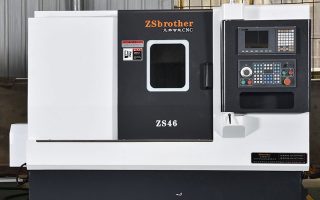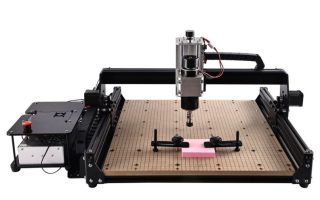
Introduction
In the world of modern manufacturing, automation plays a pivotal role in increasing efficiency and precision. One of the most critical roles in this automated landscape is that of a CNC operator. A CNC operator is responsible for overseeing the operation of Computer Numerical Control (CNC) machines, which are used to cut, shape, and manufacture parts with high precision. The CNC operator ensures that these machines function correctly and produce parts that meet the required specifications. This role is essential in industries ranging from aerospace to automotive and even electronics manufacturing. In this paper, we will explore the responsibilities, skills, and importance of CNC operators in the manufacturing sector, while also delving into the technological advancements that have shaped this profession.
Moreover, we will examine the evolution of CNC machines, their applications, and the growing demand for skilled operators in the current job market. The rise of automation has led to a surge in demand for CNC operators, making it a lucrative career choice for those with the right skill set. Additionally, the role of a CNC operator is evolving with advancements in technology, requiring operators to continuously update their knowledge and skills. This paper will provide a comprehensive overview of what it means to be a CNC operator, the skills required, and the future of this profession in an increasingly automated world.
What is a CNC Operator?
A CNC operator is a professional who operates CNC machines, which are automated tools used for cutting, shaping, and machining materials such as metal, plastic, wood, and ceramics. These machines are controlled by a computer that follows a pre-programmed set of instructions to perform precise operations. The CNC operator is responsible for setting up the machine, loading materials, monitoring the machining process, and ensuring that the final product meets the required specifications. In essence, the CNC operator acts as the bridge between the machine and the production process, ensuring that everything runs smoothly.
The role of a CNC operator has evolved significantly over the years. In the past, machinists would manually control lathes, mills, and other tools to shape materials. However, with the advent of CNC technology, much of this work has been automated, allowing for greater precision and efficiency. Despite the automation, the role of the CNC operator remains crucial, as they are responsible for ensuring that the machine operates correctly and that the final product meets the required tolerances. This requires a deep understanding of both the machine and the materials being used, as well as the ability to troubleshoot any issues that may arise during the machining process.
Key Responsibilities of a CNC Operator
The responsibilities of a CNC operator can vary depending on the industry and the specific machine being used. However, there are several core tasks that are common across most CNC operator roles:
- Machine Setup: CNC operators are responsible for setting up the machine before production begins. This includes loading the necessary tools, installing the workpiece, and ensuring that the machine is properly calibrated.
- Programming: While CNC operators may not always be responsible for writing the machine’s program, they must understand how to load and execute the program. In some cases, they may also make minor adjustments to the program to ensure optimal performance.
- Monitoring: During the machining process, CNC operators must monitor the machine to ensure that it is operating correctly. This includes checking for any signs of wear or malfunction and making adjustments as needed.
- Quality Control: Once the machining process is complete, CNC operators are responsible for inspecting the final product to ensure that it meets the required specifications. This may involve using precision measuring tools such as calipers and micrometers.
- Maintenance: CNC operators are often responsible for performing routine maintenance on the machine, such as cleaning and lubricating parts, to ensure that it continues to operate efficiently.
Skills Required for a CNC Operator
Becoming a successful CNC operator requires a combination of technical skills, attention to detail, and problem-solving abilities. Some of the key skills required for this role include:
- Technical Knowledge: CNC operators must have a strong understanding of how CNC machines work, including knowledge of machine tools, programming languages (such as G-code), and materials.
- Attention to Detail: Precision is critical in CNC machining, and operators must be able to pay close attention to detail to ensure that the final product meets the required specifications.
- Problem-Solving Skills: CNC operators must be able to troubleshoot issues that arise during the machining process, such as tool wear or machine malfunctions.
- Mathematical Skills: CNC operators often need to perform calculations related to dimensions, tolerances, and machining speeds.
- Physical Stamina: CNC operators may spend long hours standing and working with heavy machinery, so physical stamina is important.
Technological Advancements in CNC Machining
The field of CNC machining has seen significant advancements in recent years, driven by improvements in computer technology and automation. Modern CNC machines are more precise, faster, and capable of handling more complex tasks than ever before. Some of the key technological advancements in CNC machining include:
- Multi-Axis Machining: Traditional CNC machines typically operate on three axes (X, Y, and Z). However, modern machines can operate on five or more axes, allowing for more complex and precise machining operations.
- Automation: Advances in automation have made it possible for CNC machines to operate with minimal human intervention. This has increased efficiency and reduced the risk of human error.
- CAD/CAM Integration: The integration of Computer-Aided Design (CAD) and Computer-Aided Manufacturing (CAM) software has streamlined the process of designing and manufacturing parts. CNC operators can now work with digital models to create precise machining instructions.
- 3D Printing: While not traditionally considered a CNC process, 3D printing has become an important tool in modern manufacturing. CNC operators may be required to work with 3D printers in addition to traditional CNC machines.
The Future of CNC Operators
As automation continues to advance, the role of the CNC operator is likely to evolve. While some fear that increased automation could lead to job losses, the reality is that skilled CNC operators will continue to be in high demand. As machines become more complex, operators will need to develop new skills to keep up with technological advancements. This may include learning how to program and operate more advanced machines, as well as staying up to date with the latest trends in manufacturing technology.
In addition, the rise of Industry 4.0 and the Internet of Things (IoT) is likely to have a significant impact on CNC machining. These technologies allow machines to communicate with each other and with operators in real-time, enabling more efficient and precise manufacturing processes. CNC operators will need to be familiar with these technologies and understand how to use them to optimize production.
Conclusion
In conclusion, the role of the CNC operator is critical to the success of modern manufacturing. While automation has reduced the need for manual labor in many industries, skilled CNC operators are still essential for ensuring that machines operate correctly and produce high-quality parts. As technology continues to advance, the role of the CNC operator will evolve, requiring operators to continuously update their skills and knowledge. However, for those willing to embrace these changes, the future of CNC machining offers exciting opportunities for growth and advancement.
For those interested in pursuing a career as a CNC operator, the future looks bright. With the right skills and training, CNC operators can look forward to a rewarding and lucrative career in a rapidly growing industry.




